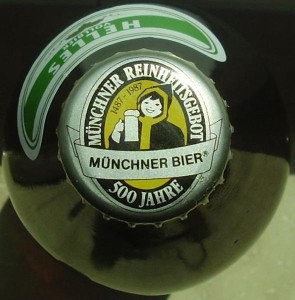The wine ‘purist’
January 8th, 2014 | Denomination
 When it comes to wine styles and the ‘typicity’ of an appellation or denomination, then I confess that I am a bit (or probably a lot) of a purist. I like my wines to taste as they should, and to be a true representation of both the grape variety and the region that they are supposed to represent. For example, I have never been a great lover of Chablis with oak, over-ripe, over-extracted Bordeaux wines, or even Albariño with oak for that matter….. but then that’s just my personal taste.
When it comes to wine styles and the ‘typicity’ of an appellation or denomination, then I confess that I am a bit (or probably a lot) of a purist. I like my wines to taste as they should, and to be a true representation of both the grape variety and the region that they are supposed to represent. For example, I have never been a great lover of Chablis with oak, over-ripe, over-extracted Bordeaux wines, or even Albariño with oak for that matter….. but then that’s just my personal taste.
On the subject of purists, I discovered only quite recently that the German beer brewers association wants a five-century-old law governing how German beer is made to become part of the UNESCO world heritage list. Written by Bavarian noblemen in 1516, the law says only water, barley and hops may be used to brew beer. Yeast was added to the list, known as the ‘beer purity law’ or Reinheitsgebot, when scientists discovered the fermenting agent centuries later.
Some brewers however, do not support this idea, as they want to be more creative, introducing aromatic hops, berries, or even spices and herbs to their beer. This is, in some ways, quite reminiscent of modern winemaking…..
Our denomination rules prevent us from adding artificial flavourings or additives to our wines (not that we would ever want to), but it is however, still possible to modify the flavour of a wine by using some of the more recently developed strains of yeast. Reading a catalogue of the yeasts available these days can be quite enlightening – some yeasts claim to enhance or perhaps exaggerate certain fruit characteristics in your grape, whilst others might even add certain a-typical flavours. Of course there is always the temptation to stray a little from the ‘norm’ and to make styles that are a touch more ‘commercial’ as I call it. Such wines might end up being easier to drink, but on the other hand, they could simply lack the real character of the grape variety and the area in which they are grown. In the end there’s quite a thin line between improving a wine, and making something that is unrecognisable and not representative of what it is supposed to be.
And that quite simply is why I will always be a purist!
 When it comes to wine styles and the ‘typicity’ of an appellation or denomination, then I confess that I am a bit (or probably a lot) of a purist. I like my wines to taste as they should, and to be a true representation of both the grape variety and the region that they are supposed to represent. For example, I have never been a great lover of Chablis with oak, over-ripe, over-extracted Bordeaux wines, or even Albariño with oak for that matter….. but then that’s just my personal taste.
When it comes to wine styles and the ‘typicity’ of an appellation or denomination, then I confess that I am a bit (or probably a lot) of a purist. I like my wines to taste as they should, and to be a true representation of both the grape variety and the region that they are supposed to represent. For example, I have never been a great lover of Chablis with oak, over-ripe, over-extracted Bordeaux wines, or even Albariño with oak for that matter….. but then that’s just my personal taste.
On the subject of purists, I discovered only quite recently that the German beer brewers association wants a five-century-old law governing how German beer is made to become part of the UNESCO world heritage list. Written by Bavarian noblemen in 1516, the law says only water, barley and hops may be used to brew beer. Yeast was added to the list, known as the ‘beer purity law’ or Reinheitsgebot, when scientists discovered the fermenting agent centuries later.
Some brewers however, do not support this idea, as they want to be more creative, introducing aromatic hops, berries, or even spices and herbs to their beer. This is, in some ways, quite reminiscent of modern winemaking…..
Our denomination rules prevent us from adding artificial flavourings or additives to our wines (not that we would ever want to), but it is however, still possible to modify the flavour of a wine by using some of the more recently developed strains of yeast. Reading a catalogue of the yeasts available these days can be quite enlightening – some yeasts claim to enhance or perhaps exaggerate certain fruit characteristics in your grape, whilst others might even add certain a-typical flavours. Of course there is always the temptation to stray a little from the ‘norm’ and to make styles that are a touch more ‘commercial’ as I call it. Such wines might end up being easier to drink, but on the other hand, they could simply lack the real character of the grape variety and the area in which they are grown. In the end there’s quite a thin line between improving a wine, and making something that is unrecognisable and not representative of what it is supposed to be.
And that quite simply is why I will always be a purist!


